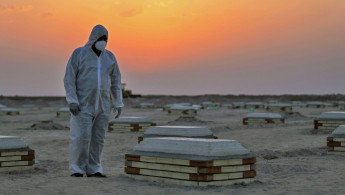The Iraq Report: Coronavirus worsens as Baghdad continues to grapple with lawless Iran-backed militias
While much of this could have been due to the Iraqi medical infrastructure simply not testing enough to verify infections, and allegations that the authorities may have been fudging their figures, it has only started to get more serious attention following the deaths of high profile Iraqis, including a senior military officer and a parliamentarian.
Meanwhile, Iraq's Prime Minister Mustafa al-Kadhimi is still grappling with unruly Shia militias with extensive ties to Iran. Dozens of pro-Iran Iraqi militants were killed in an unidentified airstrike in neighbouring Syria despite the fact they lack legal sanction to be operating on foreign territory.
The continued activities of these militias has led to senior US military personnel warning that the deterrence caused to Iranian activities as a result of its assassination of Major General Qasem Soleimani "won't last forever", setting the stage for renewed and intensified conflict between the two competing powers that will take place over Iraqi territory.
Coronavirus infections spiralling out of control
Although Iraq previously had low official numbers for rates of infection and fatalities, newly reported deaths of high profile figures have raised the spectre that the country may not be dealing with the virus as well as previously thought.
 |
Iraq's health sector has been decimated by decades of warfare and mismanagement in the post-2003 phase |  |
The Iraqi parliament announced that lawmaker Ghida Kambash died last week after contracting Covid-19, the first legislator to succumb to the deadly virus as infection rates mount nationwide.
The 46-year-old mother of four was a three-time MP for Baquba, northeast of Baghdad, and helped pass bills on educational reform and social welfare.
Last month, Parliamentary Speaker Mohammed al-Halbusi confirmed that 20 lawmakers, including Kambash, had been infected by the coronavirus. Footage from within the Iraqi legislature often shows lawmakers wearing black gloves and occasionally masks but are otherwise clustered together.
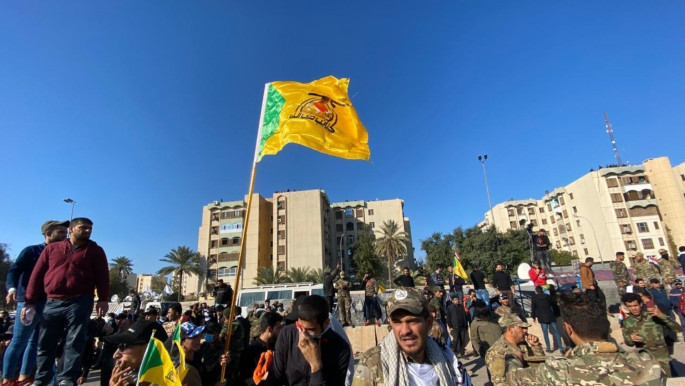 |
|
| The Iraq Report: Pro-Iran militias reassert dominance over Mustafa al-Kadhimi |
The Iraqi military also announced last Sunday that Major General Murad al-Rubaie had succumbed to the virus. The infantry commander was the highest-ranking member of the Iraqi armed forces to die of the virus, and the defence ministry released no further information about his death or infection rates within the military.
Iraq has so far recorded 75,194 infections with 3,055 deaths and more than 43,000 recoveries, according to official figures released by the health ministry.
When the coronavirus pandemic began earlier this year, Iraqi authorities ordered lockdowns, curfews, and other restrictions to reduce the risk of infection spreading through the population.
Although these restrictions were often flaunted in various spheres – ranging from social and religious, to military and political – official Iraqi figures for infections and fatalities associated with the virus were so low that the Iraqi government was praised for its handling of the virus.
However, there were also grave concerns exposed by a Reuters investigation that appeared to suggest that Baghdad was intentionally fudging its figures to reduce criticism of its handling of yet another emergency that coincided with a series of other crises relating to protests, a tanking economy, and a swiftly deteriorating security situation.
 |
The economic impact of Covid-19 has weighed heavily on an already beleaguered economy that has been battered by a severe downturn in global oil prices |  |
Reuters faced a swift backlash from Baghdad, which temporarily revoked its license to report from within Iraq and imposed fines. However, these moves were later quashed after the intervention of President Barham Salih, who feared a public relations backlash if Iraq appeared to be silencing reporters.
While Iraq saw a relatively under-reported spread of the virus in the first five months of this year, June alone saw a spike of 600 percent in infection cases, according to the International Rescue Committee, which described the infections in Iraq as "alarming".
Despite this, the federal government has announced that it intends to reopen Iraq to international travel and commercial flights on 23 July after the Iraqi Civil Aviation Authority grounded all flights in March to prevent the spread of the virus.
However, the economic impact of the coronavirus has weighed heavily on an already beleaguered economy that has been battered by a severe downturn in global oil prices as well as international agreements forcing Iraq to cut its production and therefore its sales to help prop up prices.
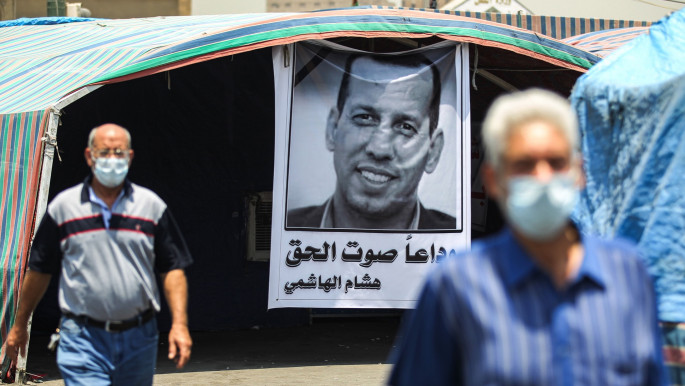 |
|
| The Iraq Report: Hisham al-Hashimi's killing sends a grim message to opponents of Shia militias |
Iraqi Prime Minister Mustafa al-Kadhimi needs to balance the safety of the public's health with the need to ensure that they have an economy to go back to once the pandemic has been brought under control or poses much less of a risk.
To that end, the Iraqi government has reopened shopping malls and reduced curfew hours, with plans to end curfews altogether by early August, according to state media.
However, it is unlikely that the Iraqi economy will recover with the easing of these measures as it is predominantly a public sector employer which is fuelled by Iraq's vast oil wealth. The private sector is weak and severely undersized, with little incentive for entrepreneurial ventures due to the lax security the country suffers from leading to organised crime, predominantly from militias.
The reality facing Iraq is also that its health sector has been decimated by decades of warfare and mismanagement in the post-2003 phase. In fact, the situation is so bad that there is now a burgeoning black market for coronavirus survivors to sell their blood plasma for up to $2,000 per litre.
 |
Mustafa al-Kadhimi has had repeated altercations with IRGC proxies who are operating under the umbrella of the Popular Mobilisation Forces (PMF) |  |
Kadhimi is therefore gambling with the public's health at a time when his government does not have a significant testing regime in place and does not have the health infrastructure to deal with a broader epidemic.
Shia militias still ignoring the chain of command
A spate of airstrikes targeting Iraqi Shia militias operating in Syria has led to dozens of fighters being killed as fears increase of significant schisms within the Iraqi military and the chain of command.
At least 35 Shia militants were killed and a number of armoured and military vehicles were destroyed by an unidentified airstrike last Friday near the city of Albukamal which is situated near to the Iraqi-Syrian border.
The target of the strikes appeared to be two militant leaders operating in Deir az-Zour governorate, local sources told Turkish state media Anadolu.
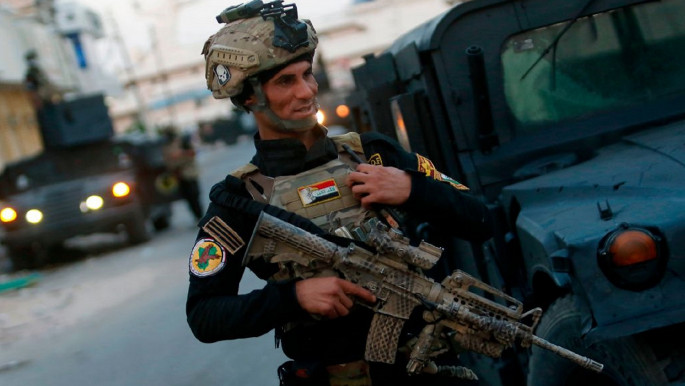 |
|
| The Iraq Report: Showdown with Iran-backed militias in Baghdad tests Mustafa al-Kadhimi's government |
The militants all belonged to groups with close ties to Iran's Islamic Revolutionary Guard Corps (IRGC) and its Quds Force – the division within the IRGC responsible for extraterritorial operations.
The IRGC Quds Force was infamously led for decades by Major General Qasem Soleimani who was killed by an American drone strike in Baghdad early this year along with a high-ranking Iraqi Shia militant, Abu Mahdi al-Muhandis.
Since assuming office months ago, prime minister Kadhimi has had repeated altercations with IRGC proxies who are operating under the umbrella of the Popular Mobilisation Forces (PMF), a paramilitary force comprised of dozens of largely pro-Iran Shia militia groups that is formally recognised as a branch of the Iraqi armed forces.
However, in reality, the PMF largely operate as loosely affiliated militia groups and mostly take their orders from the IRGC.
There is currently no bill passed by parliament or official order from the prime minister as commander-in-chief that sanctions any extraterritorial operations for the Iraqi military, yet the PMF has played an active role in the Syrian conflict fighting on the side of embattled dictator President Bashar al-Assad and his Iranian allies.
The PMF's presence in Syria is directly at the behest of the IRGC who have managed to subvert and insert themselves into the Iraqi chain of command.
While Kadhimi has attempted to take advantage of Soleimani's and Muhandis' assassinations at the hands of the US to curb the pro-Iran militias, he has repeatedly failed to rein them in, and they have openly defied him.
 |
The PMF's presence in Syria is directly at the behest of the IRGC, who have managed to subvert and insert themselves into the Iraqi chain of command |  |
Most recently, they drove a convoy of armed militants into the heart of government in Baghdad's Green Zone after Kadhimi attempted to have 14 of their number arrested but failed to detain them for longer than a day. The Shia militants were completely unopposed by either the military or the federal police.
They also stand accused of assassinating a government aide and expert adviser on terrorist organisations, Hisham al-Hashimi, who was gunned down last week outside his home in eastern Baghdad.
These events and other signs of mounting tension in Iraq have led to warnings from the head of the US Central Command, or CENTCOM, that the deterrence caused by the assassination of Soleimani was wearing off.
"I draw no confidence from periods of quiet," General Frank McKenzie said last Friday, adding that he expected the Iranians "have long-term goals to eject us [from the region]."
The senior American general also drew comparisons with the "relative period of quiet" last autumn before pro-Iran proxies ramped up attacks against the US and its allies in the region, eventually leading to Soleimani's assassination.
With Kadhimi unable to get a grip on militants who are nominally under his authority, it may therefore only be a matter of time before they escalate to the point where they provoke an American armed response, further tipping Iraq over the brink into chaos.
The Iraq Report is a fortnightly feature at The New Arab.
Click below to see the full archive.
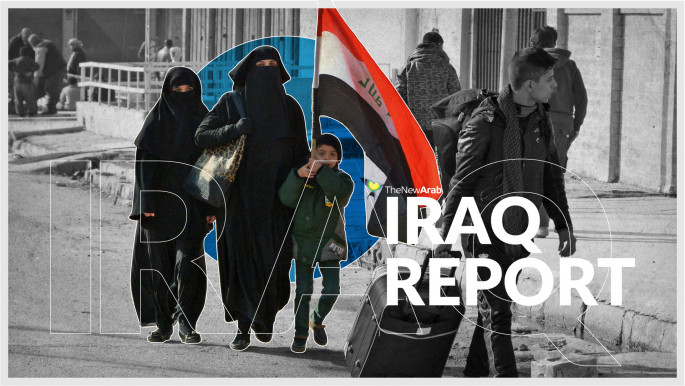 |
|
